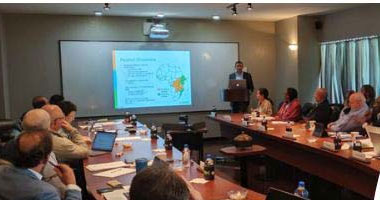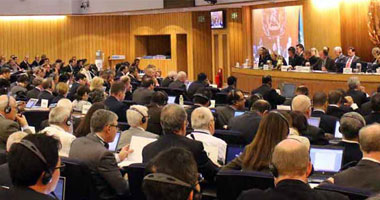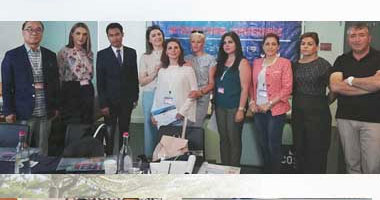Analytics, Big Data And A Shocking Waste Problem

Bernard Marr, Chief Executive,
Advanced Performance Institute
It’s a shocking fact that in the 21st century more than three quarters of a billion people do not have access to enough food to keep themselves healthy, while 30% of the food produced around the world goes to waste.
It’s partly a problem of logistics – it’s expensive to keep food fresh and get it to the people who need it most. This of course means its ripe for tackling with technology and Big Data.
Recently I had the chance to speak to one of the founders of Food Cloud – a social enterprise which harnesses the power of crowd sourcing in a bid to cut down on food wasted by retailers.
Food Cloud made headlines recently thanks to a partnership with Tesco, the UK’s biggest grocery seller. The simple premise is that it matches retailers that have surplus food stocks with charities that have the facilities to deliver it to those who need it.
Of course even a concept this elegantly straightforward requires some fairly advanced technology if it’s going to be rolled out at the sort of scale necessary to bring about social change. And plans are underway to operate the scheme in 1,000 Tesco stores by the end of the year.
Co-founder Iseult Ward told me “Our data driven approach is what differentiates us from a lot of traditional food surplus redistribution organizations.
“We’re able to collect all sorts of data on all of the food which is donated, and the organizations it is donated to, which allows us to do things like provide full sourcing and measure the performance of the stores and charities.”Thanks to the Tesco partnership, thousands of Tesco store staff have a direct link to Food Cloud’s technology. An option on their hand held scanners allows items to be marked for donation. This information is fed into the Food Cloud system in real-time and charities are alerted that it will be available for collection.
Food Cloud uses proprietary analytic technology alongside open source applications such as Apache Spark! To route donations to the charities which are most in need of them.
The real-time nature of the information flow means that problems can be detected and solved as they arise. “Looking at the donation flow, we can monitor whether donations are not close to the expected pattern – this indicated that there could be a problem,” Ward says. “So if there’s any kind of internet connectivity issues, or delivery issues, it provides us with an early warning.”
A further benefit of the large scale data collection is that it ensures traceability of the food stock throughout the entire process. Ward says “One of the key challenges in surplus food redistribution is the food safety aspect. Because now we’re collecting all this information through Tesco scanners we do have full traceability. But when we first started this was a barrier we had to overcome – how can we monitor the donation process and make sure we have full traceability from the beginning to the end. We have that now – but this is an area that I can see us continuing to develop.”
Plans are already underway to integrate more advanced monitoring and tracking processes, and Ward expects the Internet Of Things will play a big part in her mission. Ideas currently include using sensors to monitor the temperature of food during storage and transit, and location tracking to ensure transit is as efficient as possible. The company, after all, has an environmental objective as well as a social one – its data suggests that the 3.8 million meals it has so far distributed have reduced the carbon footprint caused by food going into landfill by 5.57 tons.
Food Cloud is a fantastic example of technology and data being used to solve a pressing real-world problem. The enthusiasm of Tesco as well as other large retailers such as Aldi makes it clear that there is also a clear business case for this sort of enterprise. Disposing of huge amounts of wasted food costs supermarkets a lot of money – so the fees they are charged by Food Cloud to take it off their hands is literally small change by comparison. Being able to say they are playing their part in cutting the amount of food thrown away is pretty good marketing for them, too. As a charity, Food Cloud reinvests these fees into developing and expanding its own services.
Cutting down on food waste and feeding the world’s hungry are certainly worthy ambitions, but as projects like Food Cloud show, technology is changing everything about the way services, including charity, are delivered.
Subscribe to Industry Era
News
WhatsApp for iOS is rolling out passwordless logins with passkeys
Reddit is making it easier to navigate conversations on its mobile apps
A new Google Pixel Tablet is coming, but it’s not what you think
WhatsApp Brand New iPhone Feature Just Launched That’s Much Easier To Use
Ford tops Q1 earnings expectations, sees full-year profit 'tracking to high-end' of guidance
Meta’s Miss Sparks Fear in Tech World With More Earnings Ahead
Ford just reported a massive loss on every electric vehicle it sold
Tesla stock surges as EV maker will 'accelerate' the launch of cheaper cars
Boeing to pay $443 million to airlines for Max 9 grounding as losses and problems mount
IBM to buy HashiCorp in $6.4 billion deal to expand in cloud
Stock futures fall after Meta Platforms, IBM report quarterly results: Live updates
IBM to acquire HashiCorp in $6.4 billion deal, reports another revenue miss
Sanders launches Senate investigation into ‘outrageously high’ pricing of Ozempic, Wegovy










